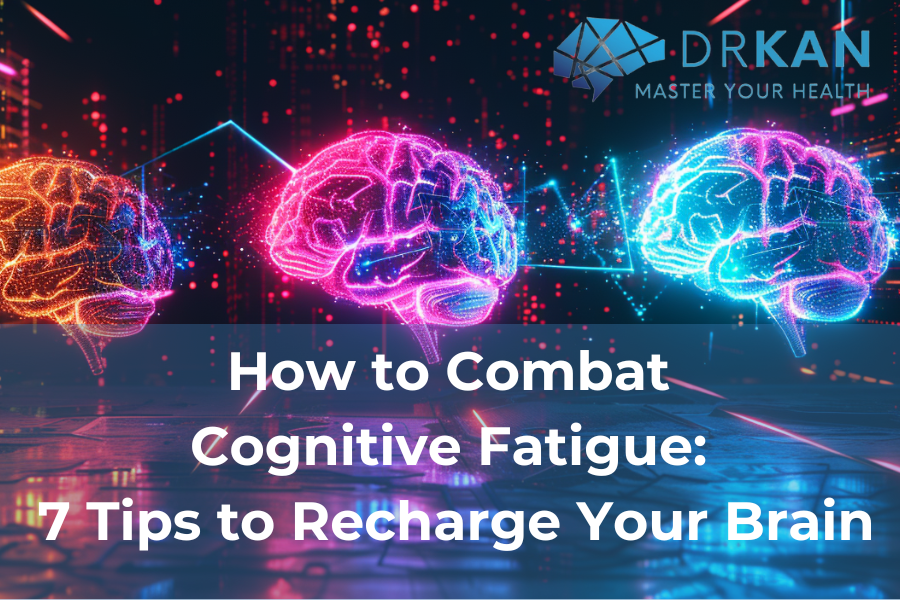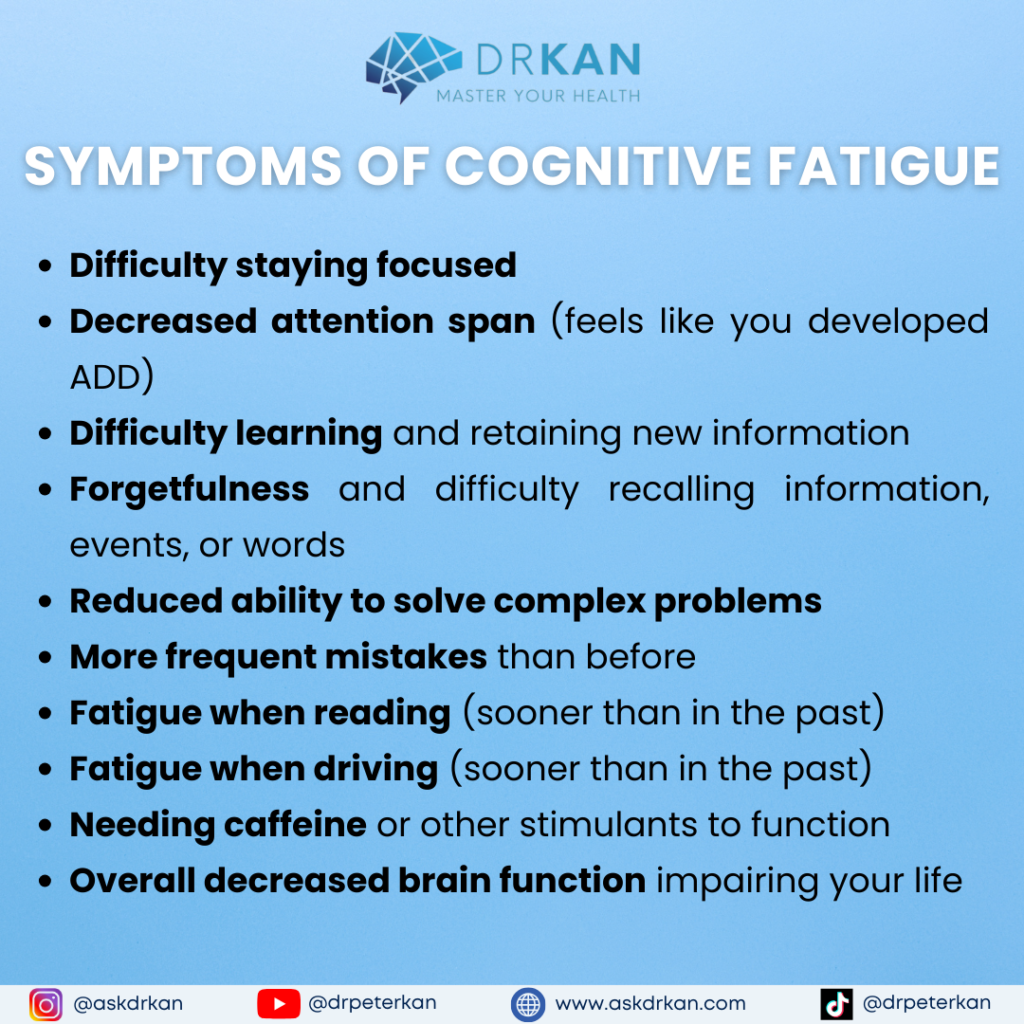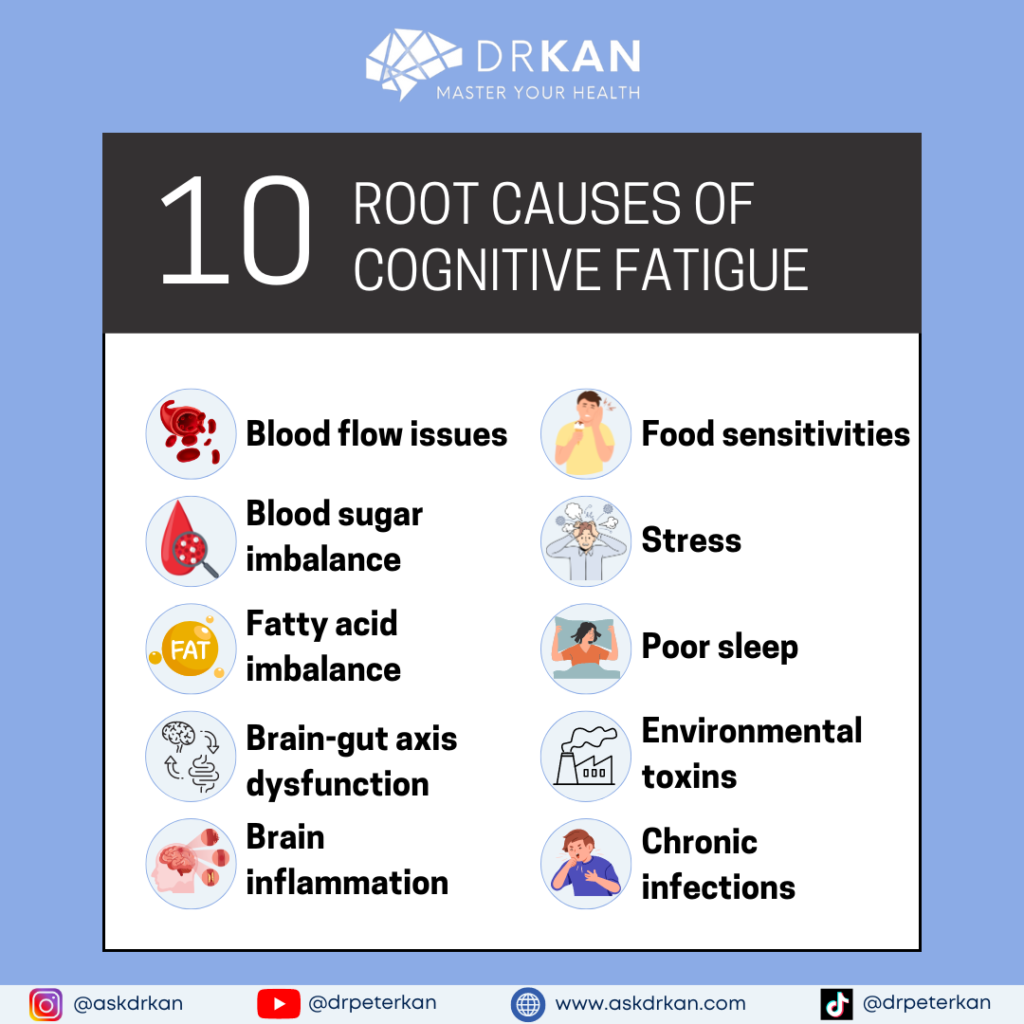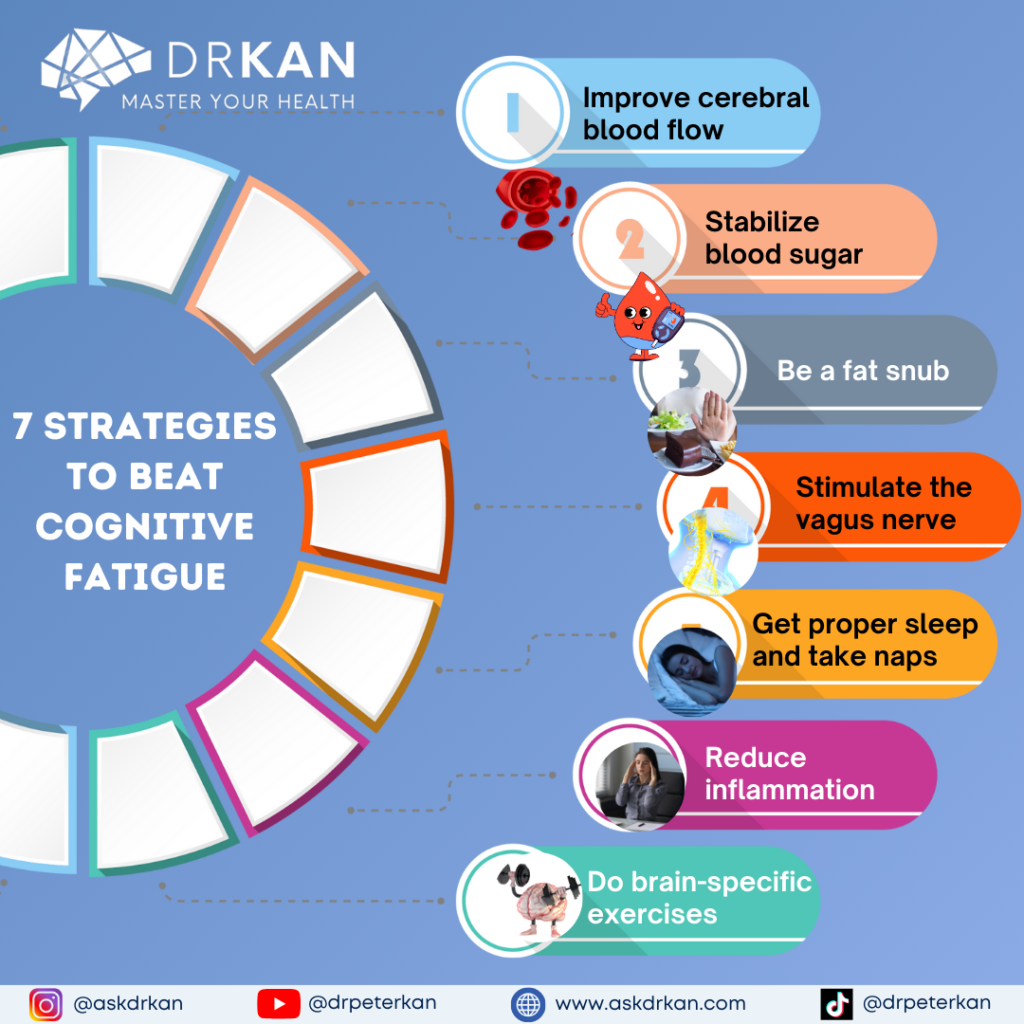How to Combat Cognitive Fatigue: 7 Tips to Recharge Your Brain

Do you feel like your brain runs out of energy faster and you just don’t have the mental endurance you once had? If you struggle with cognitive fatigue and low brain endurance, it can really make you unproductive and unhappy with your performance in work and in life!
In this article, I’m going to share the truth about cognitive fatigue, how to recognize symptoms, and how to identify the root causes. AND you will learn 7 practical strategies to beat it!
What Is Cognitive Fatigue?
Cognitive fatigue describes symptoms of decreased brain function with low brain endurance.
But cognitive fatigue is different from physical fatigue:
- Being physically fatigued means that you are tired all the time, even after you have had proper sleep and rest. You just don’t seem to recover normally!
- With cognitive fatigue, however, the symptoms tend to be brought on when you use your brain. It just tires out prematurely, or quicker than before.
You may have cognitive fatigue if you have some of the following symptom:

Symptoms of cognitive fatigue:
- Difficulty staying focused and concentrating for extended periods of time
- Decreased attention span, and feel like you are developing ADD
- Difficulty learning and retaining new information
- Manifestation of forgetfulness and difficulty recalling information, events, or words
- Reduced ability to solve complex problems or think critically
- More frequent mistakes than before
- Experiencing fatigue when reading sooner than in the past
- Experiencing fatigue when driving sooner than in the past
- Needing caffeine or other stimulants to function and stay alert
- Overall decreased brain function that impairs your life
If you have cognitive fatigue, it can be really frustrating! You feel there is a decrease in your ability to perform and excel at the things you used to do. You know you can do it, but you just don’t have the brain endurance to keep it up right now.
- Perhaps you used to be able to read for hours and retain info, and now you read for 5 minutes and you feel sleepy and tired, and can’t remember what you read.
- Perhaps you used to be able to watch a TV program and remember and enjoy the content, but now you fall asleep in 10 minutes.
- Perhaps you used to be able to fill out some paperwork or do your taxes, but now you can’t stay focused or organized enough to complete them.
- Perhaps you used to be able to go on a road trip in a car, but now you fall asleep at the wheel more easily and sooner than before.
These are all indications that your brain’s endurance and function is declining. And it is vitally important you find out why.
So How Do Doctors Diagnose Cognitive Fatigue?
Unfortunately, there is no gold standard agreed upon tests for cognitive fatigue. The diagnosis, if one is rendered, is solely based on symptoms, history, and questionnaires.
But even if you get diagnosed with cognitive fatigue, the diagnosis tells you nothing about what is causing it. Therefore no real treatment to address the root cause is offered, other than symptom-masking treatments.
Unfortunately, most conventional primary care providers do not understand the mechanisms or root causes behind cognitive fatigue. Additionally, many doctors don’t recognize the symptoms and attribute it to something else, such as depression or stress, and then prescribe a medication to mask symptoms.
Patients are often told that they are just getting old and cognitive decline is to be expected.
It is true that we all age and become physically or mentally slower as compared to our younger selves. However, if your cognitive fatigue symptoms are progressively worse and accelerating, this would be cause for concern that something more serious is going on.
This should serve as a call to action for you to start looking into the root causes of your cognitive fatigue. You can make the necessary lifestyle changes to slow down the progression and improve your quality of life.
This is why you need a proven NeuroMetabolic Roadmap to help you identify the root cause and determine a course of action based on a sequence and priority of the most pressing needs of your condition.
Root Causes of Cognitive Fatigue

The first step to overcoming any physical symptoms is to identify the root cause. So here are possible root causes of cognitive fatigue and decreased brain endurance.
1. Brain circulation issues
Blood flow delivers vital nutrients such as oxygen to all the cells of the body. Brain function is critically dependent on optimal oxygenation.
You can live without food for a few weeks and without water for a few days. But your brain cells will die within minutes without oxygen. Therefore, even sub-optimal blood flow or circulation problems to the brain can lead to noticeable decrease in brain endurance.
If you have poor circulation overall, you may also have poor circulation to the brain. Poor circulation may show up as cold hands, cold feet, cold tip of the nose, poor nail growth, fungal toenails, and low blood pressure.
2. Blood Sugar Imbalances
Next to oxygen, brain function is highly dependent on balanced and stable blood sugar. Just like Goldilocks, it should be not too high and not too low, but just right. In fact, the body is obsessed with keeping blood sugar stable. The Standard American Diet (with all the sugars, sweeteners, and refined carbs), along with a sedentary lifestyle, is the perfect recipe to damage the delicate blood sugar regulation system in the body. This leads to reactive hypoglycemia and insulin resistance.
Hypoglycemia is what happens when your blood sugar tanks between meals, causing decreased brain function and feeling “hangry.” This is like having no gas in the tank, leading to decreased brain endurance.
On the other hand, insulin resistance causes the inability of the cells to shuttle sugar molecules inside the cells to be used for energy. This results in the same low energy state inside the cells as hypoglycemia, creating cognitive fatigue symptoms.
Meanwhile the sugar molecules accumulate in the blood leading to high blood sugar and diabetes. The highly inflammatory effects of high blood sugar are especially damaging to brain cells, nerve cells, kidney cells, and blood vessels.
3. Fatty Acid Imbalance
Brain health requires a healthy amount of essential fatty nutrients, such as a balance of omega 3 and omega 6 fatty acids.
Essential fatty acids are fatty nutrients that your body cannot synthesize on its own and therefore must get from the diet. Omega-3 fatty acids can be found mainly in fatty fish, grass-fed animal protein, flax seed, hemp seeds, etc. Omega-6 fatty acids can be found in corn oil, soybean oil, sunflower seed oil, and vegetable oil.
Omega-3 fatty acids (like those found in fish oil, such as DHA and EPA) contribute to anti-inflammatory responses in the body. Omega-6 fatty acids (like those commonly found in the processed foods of the Standard American Diet) contribute to inflammatory responses.
The truth is that both omega-3 and omega-6 serve important functions in the body. Problems only arise when you have too much pro-inflammatory omega-6 in your diet, and not enough anti-inflammatory omega-3. This may contribute to brain inflammation leading to cognitive decline.
In addition to having a balanced omega fatty acid intake, the total amount of healthy fat intake is also important. This is because your brain’s composition is 70% fat. Therefore it needs fat to build a healthy myelin sheath, which is the outer covering of nerve cells that allows nerve function and neuroplasticity.
If you are adopting a very low fat diet, you may be at risk for not only essential fatty acid deficiency, but also a lack of the raw materials to build a healthy brain.
4. Brain-Gut Axis Dysfunction
There is a 2-way-communication superhighway between the brain and gut. This 2-way pathway means that the brain and gut work together to control each other’s function. This also means that when one area falters, the other area will falter also.
Leaky gut is a common condition that can impact brain endurance and brain function in 2 main ways:
- Leaky gut allows compounds that normally stay inside the gut and eliminate through the bowels (such as undigested dietary proteins and microbial contents) to leak into the blood circulation. This leads to systemic inflammation and brain inflammation.
- Leaky gut leads to impaired absorption of nutrients, which may result in nutrient deficiencies that can reduce brain endurance.
Leaky gut can be caused by chronic stress, poor diet, processed foods, chemical exposures, and blood sugar imbalance.
5. Brain Inflammation
Hallmark signs of brain inflammation include brain fog, cognitive fatigue, and depression. Brain function depends on having healthy brain cells. That means inflammation in the brain has to be kept to a minimum.
Specialized immune cells in the brain (called the microglial cells) are there to clear up damaged and injured brain cells as part of normal housekeeping. But when the microglial cells get activated due to excessive brain inflammation, they will kill off even the healthy brain cells in a vicious cycle that can lead to more brain inflammation and cognitive fatigue.
Microglial activation can be caused by traumatic brain injuries, chemical exposures, autoimmune conditions, poor diet, and other lifestyle triggers.
6. Food Sensitivities
You may have food sensitivities that can cause problems, leading to brain inflammation and leaky gut. Gluten is a protein that is in wheat, rye, barley, and other gluten containing foods. Unfortunately, gluten is a common culprit due to its ability to trigger an immune reaction which can lead to symptoms.
Gluten sensitivity reactions can be in the gut, such as gas, bloating, indigestion, and gut pain. But you may be surprised to learn that in medical research, gluten is much more recognized for its ability to cause brain symptoms and neurological disease.
One reason is because of the aforementioned brain-gut axis. Gluten is a known trigger for leaky gut. Once you have a leaky gut, you trigger systemic inflammation that spills into brain inflammation, causing your cognitive fatigue and brain symptoms.
Another reason is that the amino acid sequence that makes up the gluten protein is very similar to the amino acid sequence that makes up brain cells, such as the cerebellum, which controls balance and coordination. This can lead to a case of mistaken identity if your immune system is already sensitive to gluten. It can also start attacking brain cells due to an immune cross-reaction!
7. Chronic Stress
Short-term stress leads to a short-term stress response to overcome the stressful event. And then your body goes back to a normal resting state to heal and recover.
Chronic stress leads to maladaptation of the neuroendocrine system, which results in metabolic imbalance, inflammation, and overconsumption of fuel. It’s like you’re running away from the saber tooth tiger day in and day out!
This is a perfect recipe for burning through your reserves and therefore having cognitive fatigue and low brain endurance.
The challenge is that chronic stress is so common and accepted as normal in our society that most people are not even aware that their symptoms and poor health are closely related to their chronic stress.
8. Poor Sleep
Sleep is crucial for the brain’s recovery. By getting into deep sleep and the accompanying slow delta brain waves, the brain and the body go through deep healing.
The newly discovered glymphatic system supports drainage of the cerebral spinal fluid and detoxifies the brain. We now know that it is most active during deep sleep.
The amount and quality of sleep has been shown to be directly correlated with mental sharpness, recall, executive function, and mood. Poor sleep habits can be a huge driver of cognitive fatigue.
9. Environmental Toxin Exposure
Living in the modern world means that we must contend with the reality that toxins are all around us. It’s not a question of if! It’s more a question of how much you are exposed, and what kind of health problems they are causing you.
Toxins cause cognitive fatigue by disrupting neurotransmission, sabotaging biochemical reactions necessary for brain function. This causes oxidative stress that attacks nerve cells. This, in turn, damages neuronal mitochondrial energy production.
These mechanisms result in not only cognitive fatigue and low brain endurance, but also brain inflammation. Over time, they lead to neurodegeneration, such as Parkinson’s and Alzheimer’s Disease.
10. Chronic Infections
Opportunistic microbes (such as viruses, bacteria, candida, parasites, and even mold) can all tax the immune system and the brain, leading to cognitive fatigue.
Herpes family viruses (such as Epstein-Barr Virus, cytomegalovirus, herpes simplex 1 and 2, human herpesviruses 6 and 7) can all get in brain tissue and cause chronic inflammation and even lead to neurodegeneration.
The chronic infection doesn’t have to directly infect brain cells to cause brain symptoms. Gut dysbiosis caused by opportunistic bacteria overgrowth, Candida, or parasites can lead to immune system challenges and brain inflammation. Mold and accompanying mycotoxin exposure can have devastating effects on the brain function.
As you can see, there may be multiple causes that can lead to cognitive fatigue. And you may have unique and different causes of cognitive fatigue compared to someone else. So it is important to work with a functional neurologist and functional medicine practitioner using the NeuroMetabolic Roadmap to help you speed the healing process.
7 Strategies to Improve Cognitive Fatigue

Here are 7 practical strategies to consider implementing on your own to start the process of reversing your cognitive fatigue and improving your brain endurance.
Before I share the strategies with you, I want to give you a clinical nugget that will help you to get double the benefit from the recommendations: The strategies are also the test.
What do I mean by that?
If you implement a strategy that fixes a specific pathway, and you notice an improvement, then that proves that pathway was broken and needed fixing.
If a strategy you implement doesn’t result in improvement, it means that pathway may not be the main symptom generator for you.
Keep in mind that there may be a synergistic effect of implementing multiple strategies, and they may generate an improvement when you do them all.
This is for you to implement and find out what works for you.
With that said, here are the 7 practical strategies to consider to beat cognitive fatigue.
1. Improve Cerebral Blood Flow
The best way to improve blood flow to not just the brain, but the entire body is cardiovascular exercise. You can do either high intensity interval training, or low intensity steady state aerobics, or a mix of both.
High Intensity Interval Training
To do this, you exercise at near maximal intensity for short periods of time, followed by a recovery period. I recommend a 1:4 ratio of high intensity to rest period. You can do this with a variety of exercises, such as sprinting, biking, swimming, and rowing.
For example, you can start with a shorter interval of a 10-second sprint, followed by a 40-second walk. Repeat 4 times.
As you improve and get stronger, you can increase the interval up to a 30-second sprint, an 120 -second walk, and repeat 8 times.
Do high intensity interval training no more than 3 times per week.
High intensity interval training has been shown to increase blood flow to your body, especially the brain. Additionally, it has been shown to increase BDNF (brain derived neurotrophic factor), which is a vitally important protein produced in the brain to support neuroplasticity and brain development.
Low Intensity Steady State Aerobic Exercise
Another way to improve brain circulation is low intensity steady state aerobic exercise.
Steady state exercise means that you are exercising at the same intensity throughout the entire exercise.
‘Low intensity’ is defined by an exercise heart rate that is in the aerobic zone. This means you are burning fat and oxygen for energy, rather than using the anaerobic energy pathway of burning glucose.
There are different ways of calculating this aerobic zone.
- A simple way to calculate your aerobic training heart rate is using the Maximum Aerobic Function method described by Dr. Phillip Maffetone:
180 – your age = maximum aerobic training heart rate.
So for a 50 year old person, the maximum training heart rate to stay in the aerobic zone would be 130 beats per minute. You would aim to keep your heart rate during exercise between 120-130 beats per minute. - You can also use the rate of perceived exertion (RPE) to inform you about your aerobic zone:
Rate your exertion from 0 to 10, 10 being the most intense exercise you can do. A RPE of 2-4 would put you in the aerobic zone. - For the breath test, if you are able to maintain a conversation without being out of breath during exercise, you are in the aerobic zone.
Low intensity steady state aerobic activity is safe and gentle enough to do it everyday. Aim for a minimum 30 minutes per day, 4 days per week. Ideally, 45 minutes every day would give you the best result.
2. Stabilize Blood Sugar
In addition to exercise, dietary habits have huge impacts on your blood sugar stability and therefore fuel delivery to your brain. You want to lead the meal with protein. Then you’ll surround that protein with tons of vegetables (as many varieties as you can muster). Include moderate amounts of high quality fats, and minimize starchy carbs.
Beware of store-bought processed carbs such as chips and granola bars. Many of these products are labeled as natural or healthy. But most are made with GMO ingredients, added sugars, and industrialized and processed seed oils. These all unfortunately spike blood sugar and cause inflammation.
Meal timing is also important!
For those with hypoglycemia tendencies, eating small frequent meals with good amounts of protein, fiber and fats is important to maintain blood sugar stability.
- Nutritional supplements that contain select B vitamins, antioxidants, and minerals such as ProGlycemix can support the body’s natural blood sugar control mechanisms and energy production.
For those with insulin resistance patterns, reducing meal quantity, increasing time between meals with intermittent fasting, and restricting or eliminating sweets and processed carbs (along with exercise) are keys to success.
- Nutritional supplements that contain berberine, gymnema, banaba leaf extract such as those found in GlucoMend can support normal pancreatic function and healthy blood sugar management along with nutrition and lifestyle change.
3. Be a Fat Snub
Since your brain is mostly structural fat, you want to be really picky about the quality of fat you eat.
Increase omega 3 fatty acid intake by increasing the consumption of fatty fish, grass-fed beef, flax seeds, hemp seeds, and chia seeds. Other healthy fats include avocado, extra virgin olive oil and coconut oil, nuts such as walnuts and macadamia nuts.
You want to reduce the consumption of industrial processed oils such as corn oil, soybean oil, safflower oil, canola oil, and hydrogenated oils. You can frequently find these in packaged foods such as chips and crackers and snacks that are labeled “natural”, “healthy”, or “keto.” Fried foods are to be avoided also.
Adding a high quality and high potency omega-3 fish oil supplement with both EPA and DHA fatty acids is foundational to brain health. I recommend Omega Pure Pro, as it has clinically relevant doses that are high enough to make a difference.
4. Stimulate the Vagus Nerve
Vagus nerve is a major contributor to parasympathetic nervous system function, which works in opposition to the sympathetic “fight or flight” response.
Stimulating the vagus nerve has multiple benefits:
- Stimulating the vagus nerve inhibits sympathetic nervous system response that accompanies chronic stress response, thereby reducing stress and its harmful effects.
- Stimulating the vagus nerve improves overall digestive function and bowel regularity.
- Vagus nerve stimulation activates the inflammatory reflex which dampens inflammation in the liver, spleen, and intestine, the 3 largest areas where inflammation originates.
You can stimulate the vagus nerve by activating the muscles innervated by the vagus nerve. These are muscles in your throat involved in swallowing.
- Gag reflex: Push a toothbrush or a tongue depressor down on the back of the throat. This should induce a gag reflex. You will want to do this 5 to 10 times 2-3 times per day.
- Gargling: Take a deep breath in. Then take a sip of water and gargle very vigorously until you are out of breath. Spit out the water, take another sip and repeat 5-10 times 2-3 times per day.
- Humming: Hum very loudly and intensely for 3-5 minutes 2-3 times per day.
- Deep breathing: Slowly inhale and exhale, taking at least 5 seconds on the inhale and exhale, and prolong the exhale. Do this for at least 5 minutes, 2-3 times per day.
5. Get Proper Sleep and Take Naps
Your brain needs sleep and rest to function and recover. The most important factor with sleep is to have consistent routines:
- Consistently going to bed and waking up at the same time
- Consistently getting exercise daily (even better if it’s around the same time)
- Consistently eating the meals around the same time.
- Consistently eating in a way that stabilizes your blood sugar.
- Consistently getting plenty of sunlight exposure during the day and reducing blue light exposure at night.
Even a short nap if you have time can be a great rejuvenator for cognitive function and energy. A 10-minute cat nap and up to one hour long nap can be a great pit stop for your brain. You don’t even need to fall asleep! As long as you have your eyes closed and are not using your phone, you can still benefit from a short nap.
Some people have health conditions that may interfere with sleep. In that case, they need a detailed work up and lab tests to identify the cause and build a customized plan. But you get to control your routines, and your routines provide the consistency to train your circadian rhythm.
Start by establishing a routine consistently and work with a functional neurologist and functional medicine doctor if you need more help.
6. Reduce Inflammation
Excessive inflammation causes tissue damage and degeneration. The truth is Inflammation is a normal immune response in the body to get rid of infections and clear up cellular debris. So you want to investigate what are the triggers of inflammation for you. You will address many sources of inflammation just by implementing the previously mentioned strategies in this article.
Nutritional supplements that can support a healthy and normal inflammatory response include fish oil, turmeric, and glutathione:
Quality Fish Oil
Fish oil foundational to brain health, as I explained in detail above. I recommend Omega Pure Pro, as it has clinically relevant doses that are high enough to make a difference.
Turmeric
Turmeric has been shown in many human clinical trials to support a healthy inflammatory response. This can help to reduce pain associated with arthritis and other inflammatory conditions. Interestingly, turmeric is a fat-soluble compound that people absorb test with fat.
This is why I recommend Turmero Potency, which contains 3 different types of curcumin compounds for a comprehensive support. It also comes in a liquid gelcap of MCT oil and turmeric oil for enhanced absorption.
Glutathione
Glutathione is the master antioxidant in the body. This is because every cell in the body produces it due to its central importance in protecting the cell. However, your body’s production of glutathione is limited, and you can become depleted when you are very inflamed. Glutathione also supports immune function and plays a key factor in detoxing environmental toxins.
The rub against glutathione has always been that regular glutathione is poorly absorbed when taken orally. New technology has led to the creation of acetyl form of glutathione. It protects the glutathione molecule and helps the glutathione molecule to get inside the cell where it matters.
This is why I recommend the Acetyl Glutathione Pro. This contains both the acetyl form of glutathione for better absorption and and efficacy. It also contains NAC, which is an antioxidant in it’s own right and supports the body’s own glutathione production.
7. Do Brain-Specific Exercises
If you have a weak bicep, you would do bicep curls to engage the weak muscle to make it stronger. The same goes with the brain.
If you have a weakness or decreased function with a specific aspect of your brain, you will want to engage the brain in the very activity that it is weak in. Brain cells or neurons get stronger with use, along with proper nutrition and rest.
Identify what specific brain function you are having difficulty with. Is it memorizing a list? Is it working with numbers? Is it reading?
Once you have identified an area of weakness you want to improve, perform the activity you are struggling with and do it just shy of reaching cognitive fatigue. You want to push it a little, but not too much where you feel wiped out afterwards.
Monitor your progress and progressively increase level of intensity and duration as your brain function improves. Just like growing bigger muscles, it takes consistency and time. Be patient and stay after it, and you will feel the improvement.
Conclusion
There you have it. These strategies are free or low cost ways to start improving your brain endurance and overall health.
You can start with just a couple of strategies and gradually incorporate more as your brain endurance improves.
The key is consistency and being patient with yourself. Improving brain endurance is like improving physical endurance. It takes time to notice improvements, so give yourself a chance to let these strategies work.
You may have a unique circumstance or conditions that may need more individualized testing and strategy. This is where working with an experienced functional medicine doctor who can connect the dots between nutrition and brain function. This can help you identify the root cause and create a customized plan.
Need Customized Help?
We offer Zoom consultations to help you identify the root cause. We order functional medicine lab tests for you and design a customized eating plan, supplementation plan and detoxification plan to optimize health while reducing the dependency on medications.
If you’re struggling with chronic symptoms, and looking for root cause approach using a natural and holistic approach, please visit https://askdrkan.com/get-started for more information and to get started on the path to wellness.
